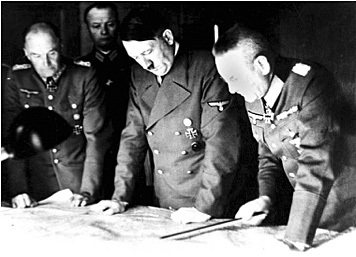
- General History, Random Notes
World War II (Part I) — The German Strategic Plan
Fortunately for the United States, the Japanese strategic plan for World War II was flawed in that the Japanese High Command decided to take on a sleeping giant in order to gain control of the Pacific basin, rather than attack the USSR. There was no way for the Japanese to beat the U.S., even with their alliance and the support of Italy and Germany. On the other hand, if the German grand strategy had been followed and carried out by Germany AND Japan, we could, very possibly, have lost the war, and today be speaking German on the East coast and Japanese on the West coast!
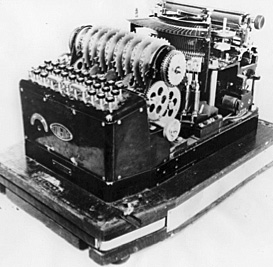
A lot of historic material exists to support various theories about how the Germans and the Japanese could have won World War II. What follows here is my take on this subject, based not only on standard history books, but on information gathered from formerly classified intelligence from U.S., German, and Soviet files, much of it published in excellent books. This treasure trove includes the released German files from Enigma deciphered (photo, left) and other captured materials, the Venona transcripts, the selectively released KGB files, and best and perhaps most authoritative of all — The Mitrokhin Archives (i.e., almost the complete files from the archives of the KGB’s First Chief Directorate up to 1984). As a result of the information contained in the Mitrokhin Archives, hundreds of Soviet spies and traitors have been uncovered, some even prosecuted for their treachery many years after it occurred. But even though we could read German and Japanese secret messages during World War II via SIGINT, and the German high command was infiltrated by Western (e.g., the Black Orchestra) and Soviet spies (including the Red Orchestra and the funkspiel radio broadcast), the Germans could still have won the war, but the Japanese got greedy and overconfident in their estimate that they could defeat the British and American forces in the Far East and did not cooperate with the German Grand Strategy.

The German Strategy was of course to crush the USSR by a two-front attack: The German Panzers were to roll into the USSR from the west, which actually took place on June 22, 1941, and the Japanese Imperial Army was to attack Siberia from the east, which never took place. As a result, we shall see what actually happened.
The Germans pleaded with the Japanese to invade Siberia in the east and catch the hated Russians between two fronts in crossfire between the two powerful, invading armies. Stalin, fearing the Japanese, had placed his best troops in the east just for that contingency. His best troops were then in Siberia, heavily armored and motorized divisions, well stocked, and with suitable winter clothes (e.g., white snow fur coats to blend in with the Siberian terrain, etc.) placed there awaiting the Japanese, who never came. The Japanese decided they wanted a different prize — namely, the Pacific region.
Just before the onset of World War II, the Japanese Army in Mongolia had been decisively defeated by those elite Siberian Soviet army units at Khalkan Gol and Lake Khasan in an almost secret encounter that involved a million soldiers. More than likely this defeat helped convince the Japanese to proceed with the Tanaka Plan or Southern strategy for the conquest of the Far East and the Pacific, rather than invade Siberia, where the Soviets had their best troops. After their defeat in Mongolia and other concerns, the Japanese Navy’s arguments for the Southern naval strategy had prevailed over the Army’s Northern Siberian military strategy.
Now we know there is more to the story thanks to two books: 1) Stalin’s Secret Agents — The Subversion of Roosevelt’s Government (2012) by M. Stanton Evans and Herbert Romerstein and 2) Operation Snow: How a Soviet Mole in FDR’s White House Triggered Pearl Harbor (2012) by John Koster. Soviet Agents of Influence in the FDR administration led by the spy Harry Dexter White, Assistant Secretary of the Treasury, acted at the behest of Moscow and Stalin, to push the Japanese into war against the United States to protect the USSR. Harry Dexter White pushed the Japanese into a corner. In the summer of 1941, Japan deficient and desperately needing raw materials and oil, resources crucial to its survival, was deliberately blocked access to them by the FDR administration. By late 1941 further deprived of oil and vital resources, Japan was forced to go to war and manipulated to attack, not the Soviet Union but the U.S., protecting the USSR from invasion from the east and being attacked and crushed on two fronts.
And on October 9, the master spy Richard Sorge radioed Moscow and reassured the Soviets that there would not a Japanese invasion of Siberia. Japan had decided to proceed with the Tanaka Plan to attack the Pacific Rim and get her raw materials and oil from Southeast Asia. On December 7, 1941, “a day that will live in infamy,” the Japanese navy and air force attacked Pearl Harbor. In 1942 the Roberts Commission placed much of the blame for America’s lack of preparedness for Japan’s attack on Pearl Harbor, unfairly, on Rear Adm. Husband E. Kimmel and Lt. Gen. Walter C. Short, the Navy and Army commanders. We now know where the blame should have been laid.

Spies Working Against the Third Reich
Among the greatest spies who infiltrated the nerve center of Nazi military intelligence were civilians like Fritz Kolbe and high ranking German officers, including Von Gaevernitz and Hans Gisevius (photo, left). But treason in the Third Reich led all the way to the top. Rear Admiral Wilhelm Canaris, head of the Abwehr, German military intelligence, was himself a double agent, our top man in Hitler’s circle! A fascinating book makes a good a case that one member of Hitler’s inner sanctum, Martin Bormann, was also a Soviet spy. The book is Hitler’s Traitor (2000) by Louis Kilzer. Kilzer also wrote Churchill’s Deception — The Dark Secret that Destroyed Nazi Germany (1994). As I stated before, the Allies could already read the German ( i.e., Enigma traffic) and Japanese secret messages because we had broken both of their codes with our decoding machines at Bletchley Park. (Some years later, we would also temporarily break and decipher the Soviet code in the Venona transcripts via Ultra.)
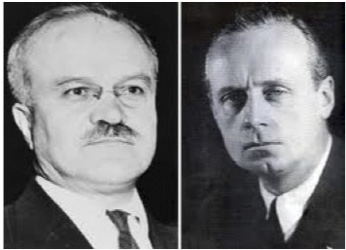
Stalin Deceived
Stalin, who did not trust anyone, put his faith in the German-Soviet Non-Aggression Pact of 1939 or the Molotov-Ribbentrop Pact (photo, left), via which they carved out Poland between themselves. Deep inside his dark inner self, Stalin wanted (or was forced by circumstances) to trust Hitler, but Hitler despised the Russians and Stalin. And so while they were talking cooperation, Stalin was thinking time to build up his Red Army, and Hitler was thinking lebensraum and Operation Barbarossa.
For Hitler, Russia was nothing but lebensraum (i.e., living space) and the Russian Slavs were to do the work of the master race, the German people, the volk. So as soon as the Battle of Britain stalemated, he responded with his planned Operation Barbarossa, the invasion of Russia over a thousand mile front, with 3 million men and more than 3000 tanks.
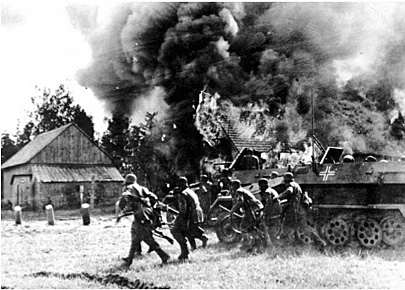
The German’s Army Group Center was pointed like a dagger toward Moscow. Their Army Group North was aimed at the Baltic States and Leningrad. And, their Army Group South was to roll toward the South, the Crimea, and eventually capture Stalingrad and the Soviet oil fields near the Caspian Sea.
Soviet spies, such as those in the Red Orchestra (Rote Kapelle) and most remarkably, Richard Sorge, not only uncovered the exact date of Operation Barbarossa (June 22, 1941), but also tried to assure Stalin that the Japanese had no intention of attacking Russia, that their intentions were in the Pacific area. But Stalin refused to listen to them or even to listen to Winston Churchill, who also tried to warn him.
And so the Germans were initially extremely successful. They conquered large chunks of Soviet territory, including the Russian breadbasket region of the Ukraine and the most populated regions in western European Russia.
The Germans did need oil and refineries to conduct the war, especially after they were not able to knock Russia out on their first blow before the winter of 1941-42 set in. In fact, one of Stalin’s reasons to “trust” Hitler in 1939-40 was the fact that he knew that Germany needed oil, and much of her oil came through the Trans-Siberia railroad that ran across the vast territory of the USSR, bringing oil and other raw material and supplies from the Pacific port of Vladivostok and Siberia to European Russia and Germany.
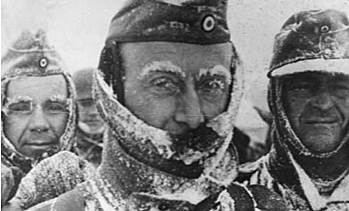
The Napoleonic Mistake
The Germans though did not run out of oil during the initial stages of Operation Barbarossa. But they did begin to run out of oil later, when they were already losing their offensive capabilities. (The Germans running out of fuel was particularly dramatized in a Hollywood movie, The Battle of the Bulge, starring Robert Shaw.)
What halted the Germans was the combination of the severe Soviet winter and lack of proper winter clothing (photo, left), the unimaginably unending vast expanse of Russian territory, and the return to the Russian western front of the reserved, fresh, best Soviet Divisions, who had been guarding Siberia in case of Japanese attack in the east.
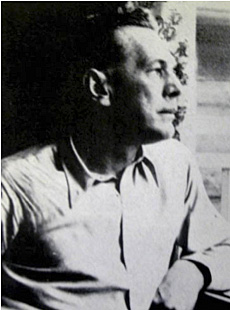
In Tokyo, as previously mentioned, Richard Sorge (photo, left), a communist German journalist led a major Soviet espionage ring, spying for the USSR and Stalin against Germany and Japan. Sorge had not only correctly radioed Stalin the exact date of the German invasion of the USSR, but he had repeatedly also radioed Stalin that the Japanese had no intention of attacking Russia. Stalin did not believe Sorge’s message that Germany would attack Russia so soon, not before defeating Great Britain, not before they had eliminated their Western front to fight en masse on a single front in the East.
Hitler unwittingly had made the same mistake as Napoleon of fighting on two fronts, something he had sworn he would not do. Japan had made its mistake and Germany had made hers. On the other hand, Stalin had finally listened to Sorge, sending those reserve troops to the Western Russian front to stop the German juggernaut.
Had the Japanese attacked Russia in the Siberian east, instead of attacking the U.S. at Pearl Harbor, the Russians would have been defeated, crushed between two fronts. Needless to say, the U.S., without the attack on Pearl Harbor, would not have entered the war until later, possibly too late.
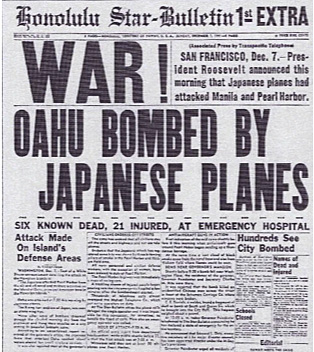
Without the U.S. as an active participant in the war, England would have eventually made peace with Germany or risked certain defeat by Germany’s war machine, the Wehrmacht; and if Churchill and the British Parliament would have insisted in war to the death with the Nazis, Britain, exhausted and with no chance of victory, would have been forced to surrender. England, with the Russians defeated and the U.S. not entering the war, would have accommodated Hitler. FDR, of course, was itching to enter the war against Hitler, but without a major provocation, it would have been very difficult to convince the American people that the U.S. needed to enter the war in Europe or later in the Pacific.
Nevertheless, the victorious German Nazis and the Japanese would probably have attacked the U.S. eventually, and then possibly attacked each other…I will leave it there. At the end, with Nazi victory assured, it would have been a global German language, but with my eternal hope and trust in our superior American institutions, I assert, that even under those conditions, English could have eventually ended on top, the U.S. over Germany. I say this, despite my earlier speculations!
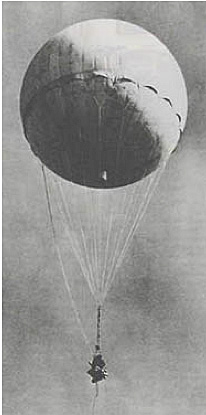
World War II on American Soil
There were enemy attacks during World War II on U.S. soil. The Japanese sent thousands of “fire balloons” (photo, left) but only about 300 of them reached North America’s Pacific coast; miraculously, five children and a woman were the only casualties.
On June 4, 1942, the Japanese Air Force bombed Dutch Harbor in the Aleutian Islands, killing more than 100 Americans, and this was shortly after followed by the Japanese invasion of the Aleutian Islands, Attu and Kiska, territories of the United States. They occupied the islands for nearly a year. Aleut islanders were taken prisoner and held in Japanese concentration camps for the duration of the war.
The Japanese also launched a submarine attack on an American military base on June 21, 1942. The submarine penetrated and surfaced in the estuary of the Columbia River in Oregon and fired missiles at Fort Stevens. No serious damage or casualties were sustained and the submarine escaped. Another Japanese submarine raid on the West coast during World War II included a raid on an oil field, which led to an “invasion scare” in California. There were also several successful torpedo attacks of ships on the West coast. There was even an aerial attack, the only aerial bombing of U.S. soil by a foreign enemy, when the Japanese unsuccessfully attempted to start a forest fire in California.
German activity was heavy on the East coast and inflicted heavy loses in shipping. There were infiltration attempts and spy rings, but to my knowledge no German invasion of the U.S. mainland. There were several German landings in Canada and Newfoundland. They were of no consequence in the vicissitudes of the war.
Continue to Part II
Written by Dr. Miguel A. Faria
This article was published exclusively for HaciendaPublishing.com on October 18, 2011. The article can be cited as: Faria MA. World War II (Part I) — The German strategic plan. HaciendaPublishing.com, October 18, 2011. Available from: https://hacienapublishing.com/world-war-ii-part-i–the-german-strategic-plan/
Portions from Parts 1 and 2 of this article were featured in RealClearHistory.com, History Live, “How Germany and Japan Could’ve Won,” February 18, 2014. Available from: https://haciendapublishing.com/how-germany-and-japan-couldve-won-by-miguel-a-faria-md/
For additional material, particularly supporting the RealClearHistory.com argument, watch the excellent History Channel documentaries, The Samurai and the Swastika (2000) and The Last Secrets of the Axis (2001).
Copyright ©2011 Miguel A. Faria, Jr., MD.
2 thoughts on “World War II (Part I) — The German Strategic Plan”
The Japanese had few natural resources of their own. When they began incursions into China and other Asian areas in 1937, the United States responded through embargoes on steel, iron, and aviation fuel sales to Japan. The hope was to stop Japanese aggression. It had the opposite effect since Japan realized it could obtain these resources from the areas it conquered. The United States together with the Dutch and the British chose to cut off oil to Japan. Japan imported 90% of its oil and this embargo, it was hoped, would have a crippling effect on its ability to wage war. https://discover.hubpages.com/politics/True-History-and-the-Lies-We-Were-Told-Japanese-Attacked-the-US-Mainland?fbclid=IwAR21XVJfM2OBCtbVTvC3ffGVrfBry5pMLJx20GxXbw8KRxJLOfnD9C-PL5c
The Battle of Kursk, my take! This is based on a discussion we had on Macon Telegraph Viewpoints (8-3-11, and I think it is worth recording here. I wrote that in the Eastern Front, WW II, the Battle of the Kursk Salient was a dramatic clash of arms between the German military and the Soviets led by Marshall Zhukov in the Spring and early Summer of 1943:
Order of Battle: Eastern Front, Battle of Kursk Salient, Largest tank Battle in history.
German commander: Field Marshall Erich von Manstein (directly under Hitler, the Fuhrer)
Russian commander: Marshall Georgy Zhukov (under Stalin, Generalissimo)
The Germans had 800, 000 men; the Russians, over 2 millions.
The Germans had 3000 tanks and big (assault) guns. The Russians threw 10,000 plus tanks and big (assault) guns.
Casualties: Germans, slightly over 200,000 men; The Russians almost a million men!
Destroyed tanks and assault guns: Germans, 720; Russians, 6000 destroyed.
The Russians had highly placed spies (“werther, ” play back funkspiel, and “the red orchestra”) and knew all of the German plans. We might have even helped the Soviets by sending decoded enigma codes, as well.
The Russians won a technical but decisive military victory! Those 700 tanks lost by the Germans to land mines strategically placed because of human intelligence (i.e., Highly placed traitors in the German High Command spied for the Soviets) made all the difference. With US supplies and assistance the Russians could afford to lose 6000 tanks but the Germans could not afford to lose 700!).
Addendum—
Espionage: The book Hitler’s Traitor by Pulitzer Prize winner, Louis C Kilzer is recommended for espionage assistance to the Russians mentioned above.
Assets and casualty figures: They have been rounded up (and tanks and big assault guns combined for convenience) and are based on estimates from various sources— all of which showed that the Russians had the advantage in both material and men. Casualties were extremely high, and it is known that like in Stalingrad, the Russian soldiers were used as “cannon fodder” to overwhelm the Germans. But as I stated, the Russians won at both battles, and it was the beginning of the end for Nazi Germany, which also had to defend Italy from the Allied invasion and troops had to be pulled back from Russia to Sicily! — Dr. Miguel Faria. Wikipedia also had an excellent entry and it is recommended.
Faria MA. World War II (Part I) — The German strategic plan. HaciendaPublishing.com, October 18, 2011. Available from: https://hacienapublishing.com/world-war-ii-part-i–the-german-strategic-plan/
Faria MA. World War II (Part II) — Deception and espionage. HaciendaPublishing.com, October 25, 2011. Available from: https://haciendapublishing.com/world-war-ii-part-ii–deception-espionage-and-total-war/
Portions from Parts 1 and 2 of this article were featured in RealClearHistory.com, History Live, “How Germany and Japan Could’ve Won,” February 18, 2014. Available from: https://haciendapublishing.com/how-germany-and-japan-couldve-won-by-miguel-a-faria-md/
For additional material, particularly supporting the RealClearHistory.com argument, watch the excellent History Channel documentaries, The Samurai and the Swastika (2000) and The Last Secrets of the Axis (2001).